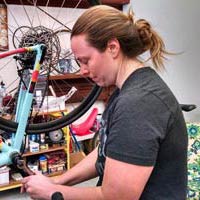Leveling Up: How to Build Bicycle Repair Skills
America’s love of bicycles keeps wheeling forward. Since 2001, the number of people commuting to work by bicycle has grown significantly. Retail sales of bicycles have consistently put up multi-billion dollar figures. City planners are developing more bike-friendly infrastructure. And while it’s not quite at the level of ubiquity seen in Amsterdam, bicycle culture in the U.S. has moved out of the realm of early adopters and firmly into the mainstream.
The benefits of bike riding are well-known at this point. Boosted health, decreased traffic, fresh air, and a little zen thrown in for good measure. However, the benefits of bicycle repair skills, which are just as diverse, are not as obvious to the average consumer. The skills required to repair and maintain a bicycle are not as intuitive as the skills required to ride one.
Just because a bicycle comes with an owner’s manual does not mean everyone’s going to read it, let alone understand it. That’s the job of bicycle mechanics, however, who not only read the manual, but know it by heart, and sometimes even write their version of it. While the savvy cyclist may understand how to change a tire, repair a chain, or replace a few simple components, those with bike repair skills are equipped to work on all manner of bicycles as they understand the balanced interaction of simple tools that allow a bike to function optimally.
It is a hobby for some and a career for others. What starts as a mentally stimulating way to save money on having someone else repair your bike for you can quickly turn into a paying profession. This is not a typical profession, either. Those with bike repair skills get to work with the materials they love, in a good-hearted environment, with similarly passionate individuals. It has never been easier to get knowledgeable about repairing and maintaining bicycles.
Read on to learn about facts, mentors, educational programs, and DIY resources related to leveling up your bicycle repair skills.
Fast Facts About Bike Repair
- Join a Growing Trend. Americans spend more than six billion dollars’ on bicycles every year, and the number of Americans riding bicycles has risen to 47.5 million. The BLS (2021) reports that the demand for mechanics and repairers (including those who work with bikes) is expected to increase by 7 percent between 2019 and 2029. That is faster than the anticipated 4 percent average increase projected for all occupations in the U.S.
- Join the Real World. There are not many jobs freer from the cubicle than working with bicycles. Bicycle repairers typically commute in the open air, work with their hands, wear comfortable clothes, and disconnect from office life.
- Join a Tribe. This is a job where people are genuinely passionate about what they do—how many industries can boast the same? Learning bicycle repair skills can help many gain access to a whole community of like-minded people.
- Join Now. Bicycle repair does not require a university degree, and there are plenty of free resources. Whether you want to work on your bike or those belonging to others, you can learn how and get started right now. The only requirement is passion.
Three Bike Shop Gurus to Know

U of Q Institute
John Barnett is the founder of the Barnett Bicycle Institute, which has now been renamed to U of Q Institute. He has been in the industry for almost half a century and was the first person to offer independent bicycle mechanic courses. He also literally wrote the book on bicycle repair and maintenance. Barnett’s Manual, which has been routinely updated since its initial publication in 1989, now exists as a digital paid download with more than 14,000 pages. Having split his time between being a columnist for trade publications, a consultant for tool and part manufacturers, a race mechanic, and a teacher, John has enshrined himself as a true leader in the bicycle industry.

Appalachian Bicycle Institute
Jenny Kallista is the 45-year-old founder and instructor of the Appalachian Bicycle Institute in Asheville, North Carolina. She has over twenty years of experience as a professional bicycle mechanic and more than sixteen years of experience teaching bicycle mechanics classes. She has taught people about how their bikes work, and how to keep their bikes in well working condition.

United Bicycle Institute
Ron Sutphin is the president of the United Bicycle Institute and has been working in the bicycle industry for more than 40 years. Since joining UBI in 1981 as an instructor, he has seen more than 15,000 students pass through the institute. As president, he oversees the faculty, which has more than 200 years of combined experience and qualifications in every avenue of the industry. Drawing on his background, he implemented frame-building classes at UBI, bringing in guest faculty and full-time staff to ensure students could learn not only how to repair bikes, but how to create them, too.
Bike Repair Programs
This distance-learning platform is an easy way to get started. It offers an online certificate program in the basic foundations of bicycle maintenance. This course is taught by bike maintenance expert, YouTuber, and cross country racer Daniel Dziemieszonek, who will teach students about servicing, repairing, and adjusting every part of their bicycle to keep it working seamlessly for years to come. They will learn to troubleshoot both road and mountain bikes, adjust their bike’s suspension, brakes, and derailleurs, service their wheels, brakes, chain, headset, and bearings, and will also learn about the most common bike maintenance mistakes.
The curriculum is divided into the following five modules:
- Introduction
- The essential bike tools
- How to adjust your bike
- How to service your bike
- Building your bike at home
Students gain a foundational understanding of each component and how to replace, repair, and troubleshoot. If students’ pass rate exceeds 55% on each exam then they will receive a certificate of completion, to recognize their achievement.
- Format: Online
- Tuition: €249 (approximately $293.73)
- Program length: Self-paced
Northwest Arkansas Community College
Northwest Arkansas Community College offers industry-recognized and affordable training helping students enhance their hobby or put them on the trail in the cycling industry. Within a year, students will have the opportunity to earn a Bicycle Industry Employers Association (BIEA) – accredited certification and will be prepared for employment in the bicycle retail industry. They will develop extensive knowledge and skills that include extensive bicycle service and repair work, service department management, bicycle assembly, bicycle mechanics, bearing and suspension systems, and electric bikes.
Apart from the technical certificate (30 to 40 hours), students can also earn an AAS in general technology (60 hours) which can be applied towards a BS in organizational leadership or operations and logistics. All courses earned in the technical certificate can be applied towards the AAS degree. The curriculum includes courses such as introduction to bicycle mechanics, basic bicycle mechanics, bicycle braking systems, bicycle drivetrain systems, ball bearing systems, and suspension systems, among others.
- Location: Bentonville, AR
- Format: On-campus
- Tuition: In-district ($75 per credit-hour); out-of-district ($135 per credit)
- Program length: Certificate (12 months); AAS (24 months)
Barnett Bicycle Institute, which has now been renamed to U of Q Institute offers individual classes for bicycle assembly and maintenance, bicycle repair and overhaul, spoked wheel lacing, and suspension service and tuning.
The faculty at the U of Q Institute believe that bicycle mechanics is a science, not an art, and their curriculum reflects that by teaching students a rigorous methodology of measurable and repeatable processes. The founder, John Barnett, wrote the bible of bicycle mechanics.
Students may pick and choose classes at their convenience. Graduates may apply to take a level one or two bicycle standard of excellence (BSE) certification exam, and link up with BBI’s network of employment opportunities.
- Location: Colorado Springs, CO
- Format: On-campus
- Tuition: Bicycle assembly and maintenance course ($1,100); professional bicycle service course ($2,200); advanced topics: suspension course ($600); advanced topics series: dropper course ($250); advanced topic series: brakes course ($250); four-day e-bike fundamentals course ($990); two-day e-bike fundamentals ($500)
- Program length: Depends on the course chosen
Located in Northern California, Bike Teacher provides training programs for every level of experience and ambition. The shorter courses clock in at under 12 hours of instruction and cover all the basics one needs to get started.
The 70-hour one-on-one course goes further geared towards students who want to work in the bicycle maintenance industry. This individualized program covers the nitty-gritty details of the sorts of components one working in a bike repair shop would come across daily, such as different types of braking systems, cranksets, and outboard.
Graduates earn a certificate of completion and obtain the resources necessary to apply for the Professional Bicycle Mechanics Association (PBMA) certification.
Editor’s Note: The PBMA is on hiatus, perhaps temporarily. Its leaders claim it may return in some form..
- Location: San Jose, CA
- Format: On-campus
- Tuition: $2,500 for the full program
- Program length: 70 hours (self-paced)
UBI is one of the most respected training institutes in the bicycle industry. The school offers bike mechanic classes for every level of experience and terrain. From a beginner’s course in basic maintenance to a professional repair and shop operation program, and advanced certification seminars and continuing education, students work in a hands-on environment with a low student-to-instructor ratio.
Many graduates have gone on to become successful shop owners and race mechanics, and the UBI regularly receives queries from distributors and manufacturers looking to hire new talent. The one-week beginner’s course costs $1,050, and the two-week professional course costs $2,150, with all the necessary manuals and textbooks included.
Some of the mechanic topics covered in the program include measuring tools, bearing theory, cartridge bearings, hydraulic brake systems, mechanical disc brake systems, derailleur cable and housing, freewheels and freehubs, and basic suspension service and setup. Shop operation topics include starting a small repair shop, tool selection, labor rates, service department operation, and start-up costs.
- Location: Ashland, OR
- Format: On-campus
- Tuition: Beginner course ($1,050); Professional course ($2,150)
- Program length: Beginner course (one week); professional course (two weeks)
DIY Bicycle Repair Training Programs and Resources
You do not need a formal program to get started on building your skills. There are plenty of resources on bicycle repair available for free. No matter your skill level, there are options to refresh your knowledge and push you forward towards true expertise. Check these out:
This is one of the cleanest and most comprehensive resources available on bicycle repair and maintenance. MadeGood offers a complete digital guide to bicycles written in simple language and organized cleanly by topic. It also has video tutorials on dozens of possible scenarios, each categorized by bicycle component.
If you’re intimidated by some of the technical jargon you’ve heard at your local bike shop, MadeGood is a quick way to learn how to overhaul a cone bottom bracket or replace a freehub body on a bike wheel. If the words come a little too foreign or too fast, you can always rewind.
Bicycling is about getting out into the real world, and if you want to connect and learn more, you might benefit from logging off and checking out your local bike shop in person. Yes, most bike shops sell and service bikes, but more importantly, they act as hubs for the community by sponsoring races and meetups, teaching classes, and answering in-context questions. Aspiring bike mechanics should ride on over and get their hands dirty.
The BikeWrench community on Reddit has more than 125,000 subscribers and plenty of daily activity. This is where the passionate nerds of the bicycling community come together to talk shop, digitally. No matter how specific and technical your question may be, there’s probably someone out there with the same problem and at least one answer as to how to fix it. Some of the posts are so technical that a large portion of the front page can resemble a foreign language, but immersion is the best way to learn.
As the saying goes, the search function is your friend. With it, you have access to a massive repository of bike repair information.


